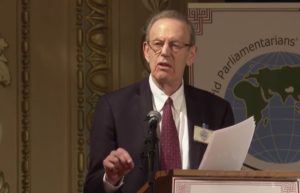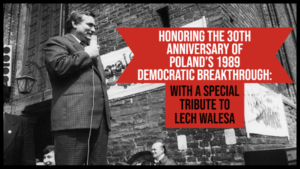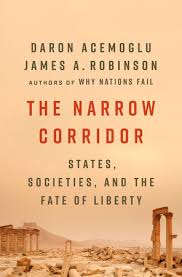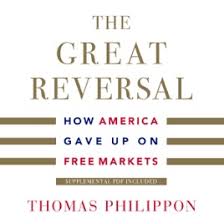 The collapse of communism in Europe 30 years ago ended a broader social-democratic compact. Does the failure to refashion that compact explain varying degrees of democratic recession and resilience?
The collapse of communism in Europe 30 years ago ended a broader social-democratic compact. Does the failure to refashion that compact explain varying degrees of democratic recession and resilience?
NATO was born in 1949 to contain a totalitarian enemy that threatened the post-war democratic Europe, a role it fulfilled masterfully for 40 years until the fall of the Berlin Wall in 1989. The December summit in London is a timely opportunity for NATO to re-position itself as a regional alliance of democracies in a largely illiberal environment, argues
Positioning NATO in an illiberal world requires it to manage its external relations with a higher degree of strategic clarity, he writes for the European Leadership Network:
- First, NATO should recognize the value of the advanced partners of European Neutrals and the EU, which are like-minded and which share the need to ensure domestic resilience.
- Second, the alliance should recognize the importance of the associated partners in eastern and south-eastern Europe, which continue to hold a potential for transformation.
- Third, it should develop ways to manage the periphery through containment of Russian influence and the instability emanating from the Middle East and North Africa, which pose existential challenges to European security.
 There’s a tension in the world today between what Larry Diamond calls the “democratic recession” and astounding and unexpected democratic resilience evident in protest movements in places like Egypt, Russia, and Hong Kong, said Carl Gershman of the National Endowment for Democracy. Authoritarians are inherently vulnerable because they have no political legitimacy. Democratic countries have a certain resilience because people want freedom and democracy.
There’s a tension in the world today between what Larry Diamond calls the “democratic recession” and astounding and unexpected democratic resilience evident in protest movements in places like Egypt, Russia, and Hong Kong, said Carl Gershman of the National Endowment for Democracy. Authoritarians are inherently vulnerable because they have no political legitimacy. Democratic countries have a certain resilience because people want freedom and democracy.
So this is going to be a battle. The critical test is, first of all, can these struggles around the world re-ignite a spirit of democracy in our own country where people do get cynical and pessimistic? And, second, can we find a way to support these struggles that are taking place? Gershman told The New Yorker’s Susan B. Glasser and American Interest contributing editor David J. Kramer in a roundtable discussion with IRI’s Daniel Twining, and Richard Fontaine on Reagan’s legacy and democracy promotion.
 The collapse of communism in Europe 30 years ago ended a broader social-democratic compact. It is time to refashion that compact for the 21st Century, says a leading analyst.
The collapse of communism in Europe 30 years ago ended a broader social-democratic compact. It is time to refashion that compact for the 21st Century, says a leading analyst.
Suddenly faced with the need to invent a new, inclusive, universalist ideology, the left proved unequal to the task. And at the same time, the leaders of an already ascendant right interpreted the collapse of communism as a signal (and an opportunity) to roll back social democracy in favour of the market, argues Daron Acemoglu, Professor of Economics at MIT, and co-author (with James A. Robinson) of Why Nations Fail: The Origins of Power, Prosperity and Poverty and The Narrow Corridor: States, Societies, and the Fate of Liberty.
 Yet, for a number of reasons, the embrace of this agenda in much of the West was mistaken, he writes for Reporting Democracy/Project Syndicate:
Yet, for a number of reasons, the embrace of this agenda in much of the West was mistaken, he writes for Reporting Democracy/Project Syndicate:
- For starters, it ignored the contribution that the welfare state, labour-market institutions and government investments in research and development had made to post-war growth.
- Second, it failed to anticipate that dismantling social-democratic institutions would weaken democracy itself, by further empowering incumbent politicians and the wealthy (who would become much wealthier in the process).
- And, third, it ignored the lessons of the interwar years, when the absence of broad-based economic opportunities and strong safety nets had created the conditions for the rise of left- and right-wing extremism.
The social-democratic compact now needs to be refashioned for the 21st Century. To that end, we need to recognise the problems facing advanced economies, from uncontrolled deregulation and finance run amok to the structural changes brought about by globalisation and automation, Acemoglu concludes.
The financial crash of 2007-8 seemed to mark the beginning of the most recent crisis of capitalism; 2016 brought news of a crisis of democracy, and the political and constitutional crisis created by Brexit marks its second act, notes Katrina Forrester, author of In the Shadow of Justice: Postwar Liberalism and the Remaking of Political Philosophy.
 It’s often said that we are also witnessing a crisis of liberalism: liberal norms are being eroded, institutions are under threat, and across Europe, parties of the centre are haemorrhaging votes. Even the Financial Times – the pinnacle of economic liberalism – recently argued that the capitalist model needs to be “reset,” she writes for the Guardian.
It’s often said that we are also witnessing a crisis of liberalism: liberal norms are being eroded, institutions are under threat, and across Europe, parties of the centre are haemorrhaging votes. Even the Financial Times – the pinnacle of economic liberalism – recently argued that the capitalist model needs to be “reset,” she writes for the Guardian.
What few realize, Mr. Philippon says, is that Europe is fast becoming a haven for free-market competition; it’s the U.S. that has become mired in an anti-competitive, quasi-monopolistic environment where companies that are “too big to fail” wield influence to crowd out newcomers and drive prices up while pushing investment and productivity down.
 Philippon’s book demonstrates the fact that our supposedly free market liberal democracy is no longer that, the FT’s Edward Luce adds.
Philippon’s book demonstrates the fact that our supposedly free market liberal democracy is no longer that, the FT’s Edward Luce adds.
So liberal centrists aren’t wrong that their institutions, parties and ideas are being challenged. But the problem may be a deeper one: that the categories of mainstream politics as we know it can no longer explain the world, notes Forrester:
With public institutions dysfunctional and liberal democracy hollowed out, liberalism no longer looks like an ideology that can explain the world: its basis falls away. Liberal political thinking is stuck. It can no longer give a convincing account of politics, except to describe what’s happening as an assault on itself. What would help liberalism make sense again is the rebuilding of those public institutions. ….What is needed is a longer and wider view than the liberal vision of politics allows – one that enables us to see how social, economic and ideological changes intersect with and shape personality and procedure.
Now liberals also have to choose: to stay where they are and try to squeeze new developments into old paradigms, or to recognise these limits. Instead of a revival of liberalism, we might need a reckoning with it, she contends.







